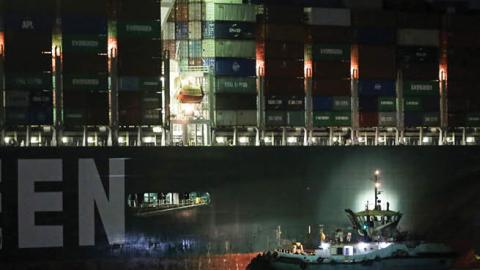After seven days, the MV Ever Given has been freed from the Suez Canal. The container ship had to be refloated and maneuvered off each canal bank. Then it had to transit the remaining length of the canal. Fortunately, high tides assisted the dredging process; without this good fortune, refloating the ship could have required removing its 18,000 shipping containers, adding several days to the operation.
The Ever Given blockage has, at first glance, primarily economic implications — and the cost was staggering: 12 percent of global trade transits the Suez Canal each day, including 1 million oil barrels and 8 percent of the world’s liquefied natural gas; the canal itself lost $15 million each day of the blockage. More broadly, the blockage — creating a backlog of nearly 500 cargo ships — interrupted $9.6 billion of trade each day. That totals approximately $67 billion, just slightly less than the Gross Domestic Product of Luxembourg, Bulgaria or Ghana. The effects on global supply chains and container availability could last for months.
The West relies on financial instruments and services industries to sustain its economic growth. The trend is so intense that a child born not too long after the millennium could be forgiven for not owning a physical bank card or carrying any hard cash. Paper currency, previously hated and hoarded in equal measure as a stand-in for gold or silver, may disappear in parts of Europe and North America, at least for the middle and upper classes.
But our electronic world still runs on things. The wealthiest individuals in the West accrue capital through financial manipulation; they “create value” by employing sophisticated arbitrage tactics and predicting share prices, reaping the added monetary value of their maneuvers. Nevertheless, people still must be fed and clothed, still must live in houses; outside of the Western middle and upper classes, they even must commute to work.
It is therefore of extreme importance — politically, not simply economically — to understand how goods travel between nations. The Suez Canal is a testament to human ingenuity, that is, to man’s desire to shape his environment and increase his production. Its construction began in the 1850s, but attempts had been made before. The canal became a global economic fixture after Britain coerced Egypt into its sphere of influence in 1882. The canal allowed European shipping to cut off weeks to months of transit time by reaching the Indian Ocean through the Mediterranean, rather than transiting around the Cape of Good Hope. After 400 years of European exploration, colonization and imperialism, the British Empire finally ruled the gate to Asia. With this gate, and its naval supremacy, Britain established a secure supply and communications route between India and the Home Islands, while ensuring its stranglehold over European-based trade.
Global economic conditions, of course, did shift. The United States and Japan became formidable economic and then military powers, asserting independent interests and shifting the global productive center of gravity away from Europe. The Suez Canal nevertheless retained its importance, particularly after the discovery of Near Eastern oil in the early 20th century. No modern power is autarchic. It is therefore a core interest — a unifying interest — among great powers to ensure freedom of the seas. Hence the importance of the Ever Given incident.
The Ever Given incident was a freak accident, most likely caused by human error and technological malfunction. But it demonstrates the ruinous damage that any disruption to international trade can cause. And for those nations that wish to hold weltmacht — world power — it demonstrates the necessity of controlling critical maritime lanes. What a single grounded tanker did with extreme imprecision, a fleet of warships could do with discrimination. By holding a central chokepoint like the Suez and denying transit to enemy ships, a nation can point a dagger at the heart of its adversaries’ economies.
The Suez is not the world’s only maritime chokepoint. Far to the east are the Straits of Malacca and Lombok, with equal economic importance to the Suez. Much of the petrochemical volume that transits the Suez will in turn transit the Malacca or Lombok straits, bound for China and Japan. China, in particular, relies upon oil imports, some 8.4 million barrels each day, followed by the U.S. (7.9 million), India (5.1 million) and Japan (3.15 million). A hostile power could deny China access to these energy imports, leaving it to scramble and make up the shortfall by boosting already strained coal production and nuclear power plant usage. The sword, however, is double-edged: By controlling the Straits of Malacca and Lombok and policing the South and East China Seas, China could rob its regional adversaries — Taiwan, Japan and Vietnam foremost among them — of energy resources, crippling their economies and undermining their stability.
The Suez is an equally tempting prize to Russia and Iran; both have overextended their capabilities, hoping to gain a marginal advantage in their ongoing “shadow wars” — the former against NATO, the latter against Israel, Saudi Arabia and the United Arab Emirates. Egypt is a U.S. ally whose regime survives due to American diplomatic and Saudi political support. But this relationship could change with a sea change in Near Eastern politics, prompted by American policy shifts, a major regional war, a revolution — in short, any number of foreseeable events and “black swans.” Russia has established a presence in the Levantine Basin, supporting Syria and partnering with Iran for tactical purposes and extending its influence to include Libya. In a broader crisis — for example, in the Baltic — the Suez could be an ideal pressure point upon which Russia could push. Similarly, a Near Eastern cataclysm would give Russia, in partnership with Iran and perhaps even Turkey, pretext to interrupt the Suez’s maritime traffic.
Of course, dealing such intentional, ruinous damage to another nation’s economy likely would be a pretext for war. And Russia and China’s political-military elite remain unsure of their military capabilities, untested as they are. But the United States and its allies must recognize that the goals of its adversaries point toward aggressive action, that international chokepoints like the Suez are prime targets and that, absent effective deterrence, these adversaries will decide the benefits of local maritime primacy far outweigh the risks of warfare.
Americans must recognize that their prosperity and security has stemmed from not simply a secure global commons but, more particularly, a U.S. military that can deny an adversary maritime access and defend trade in all situations but wartime. The Ever Given disruption was temporary and bloodless. The next disruption in global trade may be far different.
Read in The Hill
















